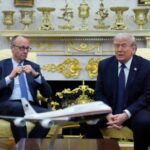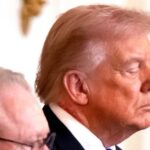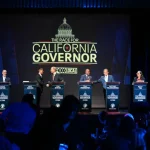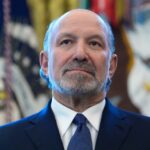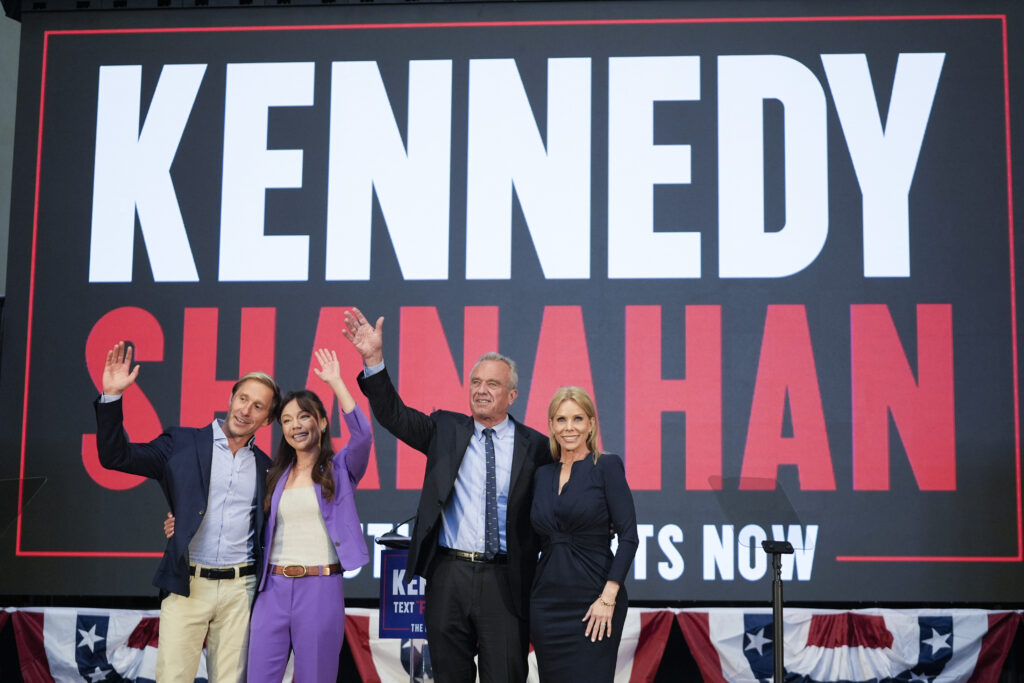
No Labels had threatened to upend a presidential race that is shaping up to be a rematch of 2020, and still could.
The group, promising to put together a third-party ticket that provides an alternative to President Joe Biden and his predecessor, Donald Trump, will announce in the next couple of weeks who would make up its presidential ticket for November.
But its difficulty finding star power to lead that ticket, plus slower-than-hoped-for efforts to gain ballot access in all 50 states, has presented an increasing likelihood: Robert F. Kennedy Jr., the Democrat-turned-independent presidential candidate, will pose a greater challenge to the two-party standard-bearers after taking on a wealthy entrepreneur as his running mate on Thursday.
This week, former New Jersey Republican Gov. Chris Christie became the latest politician to decide against running on a No Labels ticket, joining other high-profile figures including Sen. Mitt Romney (R-UT), Sen. Joe Manchin (D-WV), former presidential candidate Nikki Haley, and former Maryland GOP Gov. Larry Hogan.
ELECTION 2024: FOLLOW LATEST COVERAGE
The organization has repeatedly said it does not want to play spoiler and sees a path to victory. However, it faces two critical problems it may be unable to solve, according to Bernard Tamas, an associate professor of political science at Valdosta State University.
“The first one is that they did not actually put up what could be considered a traditional way of actually running a third-party candidate,” said Tamas, “which is that the first and foremost thing you need is some sort of a galvanizing issue that speaks to people who feel like they’re being ignored by the major parties.”
The second is its recruitment struggles.
“To add to that problem, they’re actually asking major party politicians to step away from their parties to run for them with no clear sign that there’s anything in it for them, that it’s going to have any positive impact,” added Tamas, author of the book The Demise and Rebirth of American Third Parties.
Several other political experts echoed those criticisms in previous conversations with the Washington Examiner. “They’re running out of stars to put at the top of their ticket,” said Jay Townsend, a political consultant based in New York City, earlier this month.
Kennedy has troubles of his own. His campaign has only gained access to Utah’s state ballot. Meanwhile, No Labels has qualified in well over a dozen. His previous statements flirting with conspiracy theories and vaccine hesitancy could also limit his appeal.
But Kennedy consistently hovers around 10% support in a three-way matchup against Trump and Biden, likely due to public familiarity with his last name. And his choice of Nicole Shanahan, a former Democratic donor, as his running mate will boost his efforts to gain ballot access in all 50 states, roughly half of which require a vice presidential candidate to qualify.
“I think almost certainly, he’s going to be the most consequential third-party candidacy this election and my sense is probably since Ross Perot,” said Lee Drutman, senior fellow in the political reform program at New America and author of the book Breaking the Two-Party Doom Loop: The Case for Multiparty Democracy in America.
The wealth of Shanahan, the ex-wife of Google co-founder Sergey Brin, is part of that calculus. She could help ease the financial burden of running an independent campaign.
“The biggest impact that RFK’s wealthy running mate will have is with an infusion of money for their ticket’s ballot access campaign,” said Matt Bennett, executive vice president for public affairs at Third Way, a centrist Democratic group, in a statement to the Washington Examiner. “So far, RFK has lagged well behind No Labels, which is on the ballot in more states and more major battlegrounds — even without a candidate. But if RFK can make the ballot in the swing states, the vast majority of which voted for Biden in 2020, there is a real danger that he could be a spoiler for Trump.”

No Labels announced on Wednesday that the group had gained ballot access in Wyoming, bringing the total number of states in which it qualifies to 19. Of those, at least three — Arizona, Nevada, and North Carolina — are important battleground states that could prove decisive on Election Day.
“Even some of these minor gadfly third-party candidates can sometimes tip an election,” said political consultant Nachama Soloveichik. “There’s a reason why when I’ve done Senate races and stuff, you work really hard to try to kick the Libertarian candidate off the ballot. Because even if they’re going to take 1% of the vote, these swing states are decided by a very close margin, and the presidential race is not really different than a Senate race in the sense that it’s state by state.”
In a press call hosted by the Democratic National Committee, lawmakers excoriated Kennedy’s campaign and stressed they were not underestimating his ability to harm Biden in a matchup that is expected to remain close through Election Day. A RealClearPolitics polling average shows Trump at 40.7%, Biden at 35%, and Kennedy at 12.3%.
However, experts caution against assuming that Kennedy’s supporters are simply disaffected Biden voters.
“The numbers are so small in the end that statistically, it’s actually really hard to tell for sure who they’re going to be taking more votes for,” Tamas said of third-party candidates. “So, even though it looks right now like it hurts Biden more, nobody actually knows that, which I think explains why Trump is also attacking RFK Jr.”
Trump attacked Kennedy in a Truth Social post early Wednesday morning, calling him the “most Radical Left Candidate in the race” and claiming that “he is Crooked Joe Biden’s Political Opponent, not mine. I love that he is running!”
CLICK HERE TO READ MORE FROM THE WASHINGTON EXAMINER
Soloveichik cautioned that “some people could stay home. Some people could go out and vote for down-ballot races like Senate and things like that and just leave the presidential ballot blank. It could be a range of things.”
“He’s a chaos factor,” said Drutman. “In part because it seems pretty clear that he’s going to get some support from a sort of unpredictable slice of the electorate, and I think he has the potential to cause some real uncertainty.”
